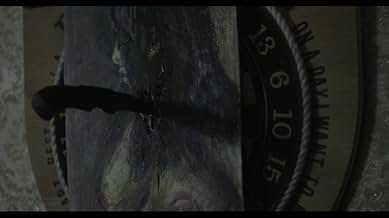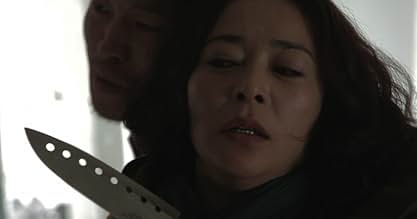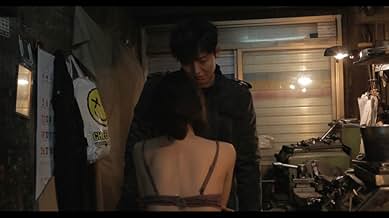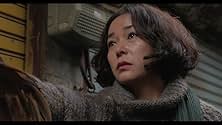IMDb रेटिंग
7.1/10
16 हज़ार
आपकी रेटिंग
एक सूदखोर को एक रहस्यमय महिला के आगमन के बाद अपनी हिंसक जीवन शैली पर पुनर्विचार करने के लिए मजबूर होना पड़ता है, वह महिला उसकी लंबे समय से खोई हुई माँ होने का दावा करती है.एक सूदखोर को एक रहस्यमय महिला के आगमन के बाद अपनी हिंसक जीवन शैली पर पुनर्विचार करने के लिए मजबूर होना पड़ता है, वह महिला उसकी लंबे समय से खोई हुई माँ होने का दावा करती है.एक सूदखोर को एक रहस्यमय महिला के आगमन के बाद अपनी हिंसक जीवन शैली पर पुनर्विचार करने के लिए मजबूर होना पड़ता है, वह महिला उसकी लंबे समय से खोई हुई माँ होने का दावा करती है.
- पुरस्कार
- 25 जीत और कुल 30 नामांकन
Lee Jung-Jin
- Gang-Do
- (as Jeong-jin Lee)
Woo Ki-hong
- Hoon-chul
- (as Ki-Hong Woo)
Cho Jae-ryong
- Tae-seung
- (as Jae-ryong Cho)
Heo Joon-seok
- Suicidal Man
- (as Jun-seok Heo)
Kwon Yul
- Machinist with the Guitar
- (as Se-in Kwon)
Yu Ha-bok
- Container man
- (as Ha-bok Yu)
फ़ीचर्ड समीक्षाएं
Directed by Kim Ki-duk
Pieta is director Kim Ki-duk's eighteenth movie. When this fact appeared on the screen, a spontaneous applause erupted. Hugely under-appreciated at home, Kim Ki-duk is well-known beyond the borders of his country South-Korea. He does not conform to any rules, doesn't avoid sensitive subjects, and shows the harshness of life without any scruples, political, humanistic and in a very physical confronting approach. It is true that his films are usually not an easy watch; they certainly do not conform to idea that film equals entertainment. The free thinking soul will see that Kim Ki-duk's movies are not made to shock the audience just for the sake of it, but to show the thoughts of a brave artist, who exhibits a rare vulnerability and a frightening honesty in his approach to his subjects.
Actress Cho Min-soo who portrays the character Mi-son in the movie declares during the press conference: "His films are eyes to reality." Apparently she and Lee Jung-Jin, who brilliantly plays main character Gang-Do, barely knew who Kim Ki-duk was when they were asked to play the parts. They tell the press that during the process of making the movie they learned to act in a completely different way.
Made with a budget that is just a fraction of Korean film budgets these days, outsider Pieta entices the jury and the public, and makes a far more lasting impression than other more obvious candidates like "To the Wonder,""At any price" and "Fill the void." Even though malicious rumors say that the jury wanted to award "The Master" all the big prizes, Kim's film is rightfully the recipient of the Golden Lion. Accepting the prize, Kim thanked the actors, staff, film festival officials and Italian fans before bursting into a traditional Korean song.
The story of the film is about lone wolf, self-absorbed: masturbating, crazy moralless man who lends money to desperate workers of the industrial slum of Cheonggyecheon. He charges ten times the borrowed sum in interest. If his clients don't pay up, Gang-do cripples them, taking the insurance payments on their injuries to make up for the difference. His character is a metaphor for extreme capitalism. Kim commented: "...but not the money itself, you can change the face of money. Money is the third character."
Then a women shows up at his doorstep, claiming to be the mother who abandoned him as a baby. He tests her in some gruesome ways, before he acknowledges her presence and even begins to show signs of affection towards her. Mi-son also proves herself to him by being just as ruthless as him. They form a frightful but also strangely intriguing duo. The grim story finds some more breathing space for the audience towards the end, but a bitter aftertaste remains.
What makes Kim Ki-duk an excellent storyteller is that most of the graphic cruelty is not shown, but actually takes place in the viewer's imagination. He is able to show real life images that can represent abstract ideas. He can make an audience relate to his characters even though they are immoral and almost heartless human beings, doing this with so much ease is remarkable. It is a rare quality to be able to find beauty in the most harsh places and to somehow convey this strange beauty to the screen. To make you believe in the story, without realizing it is perhaps an absurd one. And maybe most important: to make the viewer emotionally gripped, while talking about universal human issues, emotions and ideas even though there are cultural differences that separate audience and filmmaker. Kim Ki-duk: "(Pieta is) an embrace to the whole of humanity. The movie is dedicated to humankind."
Pieta is director Kim Ki-duk's eighteenth movie. When this fact appeared on the screen, a spontaneous applause erupted. Hugely under-appreciated at home, Kim Ki-duk is well-known beyond the borders of his country South-Korea. He does not conform to any rules, doesn't avoid sensitive subjects, and shows the harshness of life without any scruples, political, humanistic and in a very physical confronting approach. It is true that his films are usually not an easy watch; they certainly do not conform to idea that film equals entertainment. The free thinking soul will see that Kim Ki-duk's movies are not made to shock the audience just for the sake of it, but to show the thoughts of a brave artist, who exhibits a rare vulnerability and a frightening honesty in his approach to his subjects.
Actress Cho Min-soo who portrays the character Mi-son in the movie declares during the press conference: "His films are eyes to reality." Apparently she and Lee Jung-Jin, who brilliantly plays main character Gang-Do, barely knew who Kim Ki-duk was when they were asked to play the parts. They tell the press that during the process of making the movie they learned to act in a completely different way.
Made with a budget that is just a fraction of Korean film budgets these days, outsider Pieta entices the jury and the public, and makes a far more lasting impression than other more obvious candidates like "To the Wonder,""At any price" and "Fill the void." Even though malicious rumors say that the jury wanted to award "The Master" all the big prizes, Kim's film is rightfully the recipient of the Golden Lion. Accepting the prize, Kim thanked the actors, staff, film festival officials and Italian fans before bursting into a traditional Korean song.
The story of the film is about lone wolf, self-absorbed: masturbating, crazy moralless man who lends money to desperate workers of the industrial slum of Cheonggyecheon. He charges ten times the borrowed sum in interest. If his clients don't pay up, Gang-do cripples them, taking the insurance payments on their injuries to make up for the difference. His character is a metaphor for extreme capitalism. Kim commented: "...but not the money itself, you can change the face of money. Money is the third character."
Then a women shows up at his doorstep, claiming to be the mother who abandoned him as a baby. He tests her in some gruesome ways, before he acknowledges her presence and even begins to show signs of affection towards her. Mi-son also proves herself to him by being just as ruthless as him. They form a frightful but also strangely intriguing duo. The grim story finds some more breathing space for the audience towards the end, but a bitter aftertaste remains.
What makes Kim Ki-duk an excellent storyteller is that most of the graphic cruelty is not shown, but actually takes place in the viewer's imagination. He is able to show real life images that can represent abstract ideas. He can make an audience relate to his characters even though they are immoral and almost heartless human beings, doing this with so much ease is remarkable. It is a rare quality to be able to find beauty in the most harsh places and to somehow convey this strange beauty to the screen. To make you believe in the story, without realizing it is perhaps an absurd one. And maybe most important: to make the viewer emotionally gripped, while talking about universal human issues, emotions and ideas even though there are cultural differences that separate audience and filmmaker. Kim Ki-duk: "(Pieta is) an embrace to the whole of humanity. The movie is dedicated to humankind."
Pieta,winner of Venice's 2012 Golden Lion is another disturbing,compelling,metaphorical Kim Ki-Duk masterpiece.The plot unfolds as an unusual revenge story yet the metaphors tell another tale.
Named after Michelangelo's masterpiece housed in St.Peter's Basilica in Vatican,Pieta is not easy to watch but a thought-provoking experience about the misdeeds of industrial capitalism and how it slowly and finally drains the vitality from those who are not able to cope while creating monsters of others.The mystery that surrounds the two main characters lend an almost 'eerie' atmosphere to the film which is typical of Kim Ki-Duk.
Definitely not for the faint-hearted,the pleasure seeker or the romantic...this is a serious film and certainly a rewarding experience for the true 'cinephile'.
Named after Michelangelo's masterpiece housed in St.Peter's Basilica in Vatican,Pieta is not easy to watch but a thought-provoking experience about the misdeeds of industrial capitalism and how it slowly and finally drains the vitality from those who are not able to cope while creating monsters of others.The mystery that surrounds the two main characters lend an almost 'eerie' atmosphere to the film which is typical of Kim Ki-Duk.
Definitely not for the faint-hearted,the pleasure seeker or the romantic...this is a serious film and certainly a rewarding experience for the true 'cinephile'.
It's a dark and brutal morality tale of guilt and redemption, the movie "PIETA" tells a story of a debt collector Kang-do(Lee Jeong-jin) works as a debt collector for some loan shark, and he is someone you don't want to mess with especially if you happen to borrow the money from his boss. Even if his poor debtors really have no money to pay back, he gets the money back by any ruthless means necessary. These unfortunate debtors usually work at the metal shops located on the narrow alleys of Seoul, so they are forced to get their hands or feet injured by their machines for paying him back through the insurance money they will acquire. During one comic but cringe-inducing moment, one debtor nervously asks him to cut both of his hands instead of only one hand because he needs more money to pay his debts and support his baby to be born.
Kang-do's life is as barren as his debtors'. While his home looks a little more comfortable, he has lived alone in his apartment. He cooks for himself, and he usually brings live animals to his home for his dinner. To represent his beastly nature, he prefers to buy a live chicken and then butcher it instead of just purchasing a dead one. On one day, his life is disrupted by the sudden appearance of one mysterious woman(Cho Min-soo), who claims to be his mother and apologizes to him for abandoning him not so long after he was born. Resentful toward his mother he does not remember, he does not believe any of her words and brusquely rejects her, but she keeps coming to him. She slowly insinuates herself into his daily life while behaving like a mother who tries to compensate for her unforgivable fault in the past. Though he harshly treats her, she sticks to him while doing what mothers usually do for their dear sons. She cooks for him, and she says genially to this detestable man who has probably never experienced love or kindness for a long time.
There is quite a disturbing scene where Kang-do cruelly attempts to violate her with his own twisted logic, and you may wonder how much she can tolerate him, if she is indeed who she seems to be. Induced by her love without condition, Kang-do slowly reveals a vulnerable child with lots of hurts inside him; he eventually finds himself depending on her care, and they momentarily have a nice time together as a mother and her son.The tension in the drama largely depends on the simple but fearless performance by Cho Min-soo, who deftly maintains the elusive side of her character even at the most emotionally anguished moment. Their characters may look silly when they behave like a mother and her little son, but we come to accept the emotional bond forming between them.
And later scenes become very intense and heart touching. Overall I do not think it is one of his best films because of its several flaws, but I must say it is nice to see that this talented director is still capable of making a movie with conviction, power, and several interesting things to talk about.
Kang-do's life is as barren as his debtors'. While his home looks a little more comfortable, he has lived alone in his apartment. He cooks for himself, and he usually brings live animals to his home for his dinner. To represent his beastly nature, he prefers to buy a live chicken and then butcher it instead of just purchasing a dead one. On one day, his life is disrupted by the sudden appearance of one mysterious woman(Cho Min-soo), who claims to be his mother and apologizes to him for abandoning him not so long after he was born. Resentful toward his mother he does not remember, he does not believe any of her words and brusquely rejects her, but she keeps coming to him. She slowly insinuates herself into his daily life while behaving like a mother who tries to compensate for her unforgivable fault in the past. Though he harshly treats her, she sticks to him while doing what mothers usually do for their dear sons. She cooks for him, and she says genially to this detestable man who has probably never experienced love or kindness for a long time.
There is quite a disturbing scene where Kang-do cruelly attempts to violate her with his own twisted logic, and you may wonder how much she can tolerate him, if she is indeed who she seems to be. Induced by her love without condition, Kang-do slowly reveals a vulnerable child with lots of hurts inside him; he eventually finds himself depending on her care, and they momentarily have a nice time together as a mother and her son.The tension in the drama largely depends on the simple but fearless performance by Cho Min-soo, who deftly maintains the elusive side of her character even at the most emotionally anguished moment. Their characters may look silly when they behave like a mother and her little son, but we come to accept the emotional bond forming between them.
And later scenes become very intense and heart touching. Overall I do not think it is one of his best films because of its several flaws, but I must say it is nice to see that this talented director is still capable of making a movie with conviction, power, and several interesting things to talk about.
As a massive fan of Korean director Kim Ki-duk - I've never seen a film of his I haven't loved - I was eager to see what delights his new film PIETA had in store for the viewer. In some ways it's similar to a lot of his previous filmography, like BAD GUY, in which the protagonist is also the antagonist, and also similar to other Korean films I've seen like BREATHLESS.
The main character is a ruthless loan shark who makes a living from crippling those who owe him money; he gets the money back from their insurance claims. The glacial Lee Jeong-jin gives an icy turn as a truly horrible creation, but inevitably he thaws a little once you get to know him, and once the plot kicks in. This is a revenge story, but one done in a way that's both subtle and convoluted; it's a film that rewards close attention, else you won't have a clue what's going on.
Jo Min-soo bags the film's most interesting role of the long-lost mother who turns up seeking reconciliation. It's a difficult, unsympathetic part to play, and there are one or two sexual situations which go way beyond the realms of bad taste into some of the most disgusting things I've ever seen. As ever, though PIETA isn't really an explicit film, despite the sheer quantity of violent incidents that happen during the running time, and as a story it gets more and more engrossing as it goes on. The end is particularly profound, and the lush cinematography on a tiny budget makes this a beautiful film to watch, despite the depravity.
The main character is a ruthless loan shark who makes a living from crippling those who owe him money; he gets the money back from their insurance claims. The glacial Lee Jeong-jin gives an icy turn as a truly horrible creation, but inevitably he thaws a little once you get to know him, and once the plot kicks in. This is a revenge story, but one done in a way that's both subtle and convoluted; it's a film that rewards close attention, else you won't have a clue what's going on.
Jo Min-soo bags the film's most interesting role of the long-lost mother who turns up seeking reconciliation. It's a difficult, unsympathetic part to play, and there are one or two sexual situations which go way beyond the realms of bad taste into some of the most disgusting things I've ever seen. As ever, though PIETA isn't really an explicit film, despite the sheer quantity of violent incidents that happen during the running time, and as a story it gets more and more engrossing as it goes on. The end is particularly profound, and the lush cinematography on a tiny budget makes this a beautiful film to watch, despite the depravity.
Pieta is the story of revenge in a most brutal way possible by giving one's own life, a story of mother's love for his son. Story tells us the extreme measures taken by a mother to take the revenge from a non-human brutal loan shark.
Jung-Jin Lee is living a lonely life whose sole purpose is to recover the loan from other people by making them cripple and claiming their insurance money. In doing so he has become so cold inside that he feels nothing and know no pain. Brutality is the everyday life matter.
Enters a woman stirring everything by claiming that she is his mother. she make him feel love, make him angry and make him feel pain just to take the revenge of her son. And when Jung-Jin starts to feel human again, she inflicted the deep scar into his soul by giving her own life.
Movie is full of disturbing content and makes for a haunting viewing. I am a fan of south Korean cinema and this movie takes the love affair to another level.
8/10
Jung-Jin Lee is living a lonely life whose sole purpose is to recover the loan from other people by making them cripple and claiming their insurance money. In doing so he has become so cold inside that he feels nothing and know no pain. Brutality is the everyday life matter.
Enters a woman stirring everything by claiming that she is his mother. she make him feel love, make him angry and make him feel pain just to take the revenge of her son. And when Jung-Jin starts to feel human again, she inflicted the deep scar into his soul by giving her own life.
Movie is full of disturbing content and makes for a haunting viewing. I am a fan of south Korean cinema and this movie takes the love affair to another level.
8/10
क्या आपको पता है
- ट्रिवियाShot digitally on two Canon EOS 5D Mark II DSLR cameras. The director operated one of the cameras himself.
- कनेक्शनFeatured in At the Movies: Venice Film Festival 2012 (2012)
टॉप पसंद
रेटिंग देने के लिए साइन-इन करें और वैयक्तिकृत सुझावों के लिए वॉचलिस्ट करें
- How long is Pieta?Alexa द्वारा संचालित
विवरण
बॉक्स ऑफ़िस
- बजट
- €1,03,000(अनुमानित)
- US और कनाडा में सकल
- $22,080
- US और कनाडा में पहले सप्ताह में कुल कमाई
- $6,222
- 19 मई 2013
- दुनिया भर में सकल
- $66,16,296
- चलने की अवधि1 घंटा 43 मिनट
- रंग
- ध्वनि मिश्रण
- पक्ष अनुपात
- 1.85 : 1
इस पेज में योगदान दें
किसी बदलाव का सुझाव दें या अनुपलब्ध कॉन्टेंट जोड़ें






























